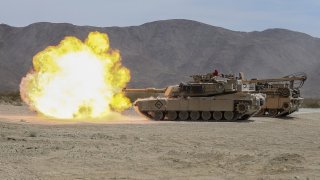by Kris Osborn

Members of the North Atlantic Treaty Organization are stepping up cooperation and commitment to collective security by increasing defense contributions and joining the U.S. in deterring China, what Defense Secretary Lloyd Austin calls a “pacing threat.”
Members of the North Atlantic Treaty Organization are stepping up cooperation and commitment to collective security by increasing defense contributions and joining the U.S. in deterring China, what Defense Secretary Lloyd Austin calls a “pacing threat.”
Briefing reporters following the virtual NATO Defense Ministerial meeting, Austin praised what he called the “unique perspectives” on deterring China from several key member nations to include Finland, Sweden and the European Union.
“I applaud NATO's work on China and I made it clear that the United States is committed to defending the international rules-based order, which China has consistently undermined for its own interests,” Austin said, according to a Pentagon transcript of the discussion.
While of course initially formed to counter the former Soviet Union on the European continent, NATO has proven responsive in other areas of the world, such as Afghanistan following 9/11 following the historic invocation of NATO’s Article 5 defensive clause protecting all members from an attack. Given the growing global connectivity with advances in satellite technology and networking, there is no reason why the reach, scope, and protective envelope offered by NATO could not impact the Pacific as well.

There are many dynamics to this, including the growing realization related to Chinese global expansionism into places like Africa, where the Chinese government is known to be pursuing what some call a kind of “economic imperialism” aimed at increasing influence, ownership and power in the region. Also, the PLA has added a new military base near a well-known U.S. base in Djibouti and increased its presence in the area. Not only is Africa within range of NATO forces in many key respects, but the northern border parallels the Meditteranean Sea, where NATO can have a large surface, undersea and aerial presence.
“I'm heartened to see that many of our allies meet or exceed NATO's 2014 Defense Investment Pledge, nine of the -- nine of them this year alone,” Austin added.
How might NATO have an impact in the Pacific? Certain interesting possibilities come to mind such as joint, collaborative training exercises in the region utilizing global deployments from NATO member countries. There is also the clear reality that Space and Cyber domains know no boundaries, meaning they could be impactful in substantial ways without necessarily relying upon geographical proximity. NATO-allied satellites, particularly if operating within global networks, could help locate Chinese missile launches and, perhaps in a more immediate sense, track Chinese movements and deployments beyond the specific, something which China is increasingly pursuing as it migrates quickly from a dominant regional power to becoming a leading global power.
“We here at the Pentagon and the Department of Defense view China as our primary pacing challenge and we believe NATO can help us better think through our operating concepts and investment strategies when it comes to meeting that challenge,” Austin said.
While being clear to emphasize that security, deterrence and meeting global threats are the Pentagon’s number one priority, Austin responded to a question about possibly decreasing tension with China by saying “no doubt there are some areas where we will see common interest and there may be an opportunity to engage.”
At the same time, Austin was clear that any engagement “will be from the standpoint of promoting our bests interests.”
“My number one concern and my number one job is to defend this country and protect our interests. And so we are -- in this department are going to do everything possible to ensure that we have the right operational concepts, the right plans in place, and that we have resourced those plans with the right capabilities to present a credible deterrence to -- not only to China or any other adversary who would want to -- want to take us on,” Austin said.
Kris Osborn is the defense editor for the National Interest. Osborn previously served at the Pentagon as a Highly Qualified Expert with the Office of the Assistant Secretary of the Army—Acquisition, Logistics & Technology. Osborn has also worked as an anchor and on-air military specialist at national TV networks. He has appeared as a guest military expert on Fox News, MSNBC, The Military Channel, and The History Channel. He also has a Masters Degree in Comparative Literature from Columbia University.
No comments:
Post a Comment